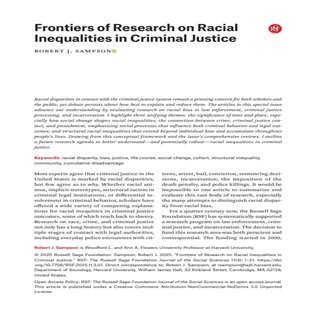By Robert J. Sampson
Racial disparities in contact with the criminal justice system remain a pressing concern for both scholars and the public, yet debate persists about how best to explain and reduce them. The articles in this special issue advance our understanding by evaluating research on racial bias in law enforcement, criminal justice processing, and incarceration. I highlight three unifying themes: the significance of time and place, especially how social change shapes racial inequalities; the connection between crime, criminal justice contact, and punishment, emphasizing social processes that influence both criminal behavior and legal outcomes; and structural racial inequalities that extend beyond individual bias and accumulate throughout people’s lives. Drawing from this conceptual framework and the issue’s comprehensive reviews, I outline a future research agenda to better understand—and potentially reduce—racial inequalities in criminal justice.
RSF: The Russell Sage Foundation Journal of the Social Sciences 11(3): 1–21.


